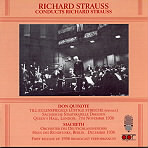The general consensus during Richard Strauss’ conducting heyday was that he was a more effective and inspired podium figure in front of an audience than when facing a studio microphone. A newly discovered “live” Don Quixote from a 1936 London concert seems to bear this out. Through a barrage of surface scratch and faded sonics, we hear tempo relationships between sections that are quite similar to both of the composer’s studio versions, but with greater inflections of phrase and sharper characterization within each variation. What’s more, the Staatskapelle Dresden (whose music director at the time was Karl Bohm) plays rings around its Berlin State Opera and Bavarian studio counterparts, as do the excellent Don Quixote/Sancho Panza tag team of Karl Hesse and Georg Seifert. Also on the concert was Till Eulenspiegel, for which roughly the first half survives, and adds little to what we know of Strauss’ straightforward self-interpretation. A 1936 German radio account of his early Macbeth, though, preserves Strauss’ intense, bracing leadership in a work he otherwise didn’t record–in excellent broadcast sound for the period. A disc all Strauss specialists must own.
































